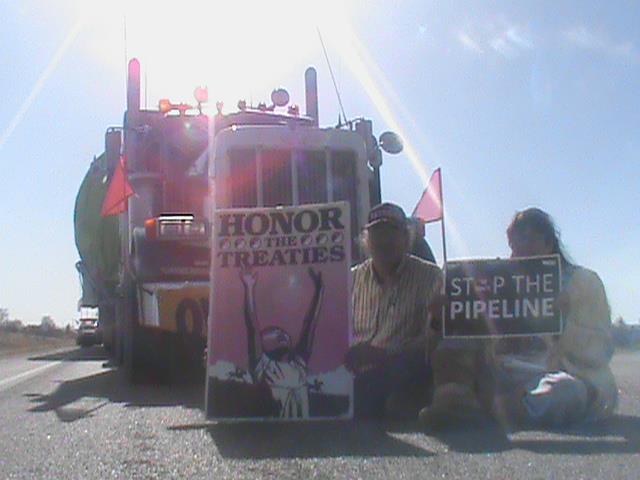By Chase Iron Eyes / Last Read Indians
March 5th, 2012, everyone had their ear to the new moccasin telegraph. Social networks, telephones, and word of mouth networks were abuzz with reports of Oglala Lakota Nationals preventing oil pipeline materials, destined for Canadian Tar sands and/or Keystone XL infrastructure locales or some unknown destination, from being transported across the Pine Ridge Reservation’s Treaty territory. Information travelled to Debra and Alex White Plume (Owe Aku, Inc. “Bring Back the Way) and Olowan Martinez that semi-trucks loaded with enormous oil pipeline components were set to cross Oglala territory sometime during the afternoon on March 5th, 2012; “We did not know where the equipment was going, but we knew that these trucks were too huge, too heavy, and too dangerous to pass our roads. We thought the equipment may be going to the Tarsands oil mine, or other oil mines in Canada,” Debra White Plume explained.
A call went out via digital media and other sources for all able bodied and willing participants to mobilize and report to Wanblee, South Dakota, for an impromptu gathering of scores of activists ready to block the road with their bodies to prevent semi-trucks and pipeline components from crossing Oglala Territory. Within minutes the confrontation happened as several State and Tribal police officers and other officials responded to the tense scene. Oglala Tribal police arrived immediately with one Sergeant telling the road-blockers that the South Dakota Highway Patrol was parked a few miles down the road at the border between Oglala Country and the State of South Dakota but that the SD Highway Patrol would not proceed onto the reservation. Notably, this Sergeant also advised those present that the FBI (Federal Bureau of Investigation) was en route to the reservation in two vans from Rapid City, SD. However, at the conclusion of the day there were no signs of such FBI presence.
The Texas semi-trucks, transporting 1.25 Million-dollar “Treater Vessels” used in oil, gas and element separation, were stopped in their tracks as they approached the human roadblock. The human roadblock that featured two Lakota grandmothers: Renabelle Bad Cob Standing Bear (in her wheelchair) and Marie Randal (in her 90s). The drivers were questioned by those forming the blockade as to why they were crossing Oglala lands. One of the drivers responded that they did not know they were crossing Indian land, only that they were following company directives regarding their assigned routes and that their Canadian Corporation had received this particular route information as a result of a partnership with the State of South Dakota, whose elected officials have always supported the Keystone XL pipeline. This information prompted Tom Poor Bear (Vice President of the Oglala Lakota Nation) to phone South Dakota State officials in Pierre, SD, inquiring as to the nature and origin of the route of the stopped truckers. South Dakota affirmed to Oglala Vice President Tom Poor Bear that indeed the State was involved with planning such route, ostensibly without consulting the Oglala Lakota Nation. The heavy-hauling trucks were allegedly cutting through Oglala country in attempts to avoid a $50,000.00 per-truck-fee to pass through using State of South Dakota roadways.
Read more from Last Real Indians
